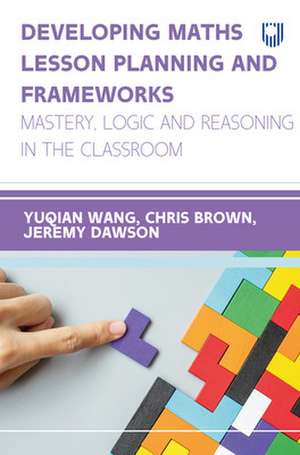Developing Maths Lesson Planning and Frameworks: Mastery, Logic and Reasoning in the Classroom
Autor Linda (Yuqian) Wang, Jeremy Dawson, Chris Brownen Limba Engleză Paperback – 15 noi 2023
Hayley Hands, Secondary PGCE Mathematics Lead, Newcastle University, UK
“Developing Maths Lesson Planning and Frameworks provides much food for thought and includes many immediate ‘take aways’ to reflect on or try out. This book will help enhance any maths teacher's lesson planning, from the trainee teacher to the experienced practitioner.”
Rose-Marie Rochester, Archimedes NE Maths Hub Lead/BHCET Director of Maths, UK
Addressing the maths skills gap, Wang et al. propose a new method for maths lesson planning that harnesses the power of reasoning in mathematics teaching. Using a pedagogical approach called the Causal Connectivity Framework (CCF), this book helps teachers to support students in actively discovering the logical foundations upon which classroom activities are linked together.
The authors have diverse expertise and experiences as maths teachers, teacher educators and researchers, and this alternative approach is the result of long-term collaboration aimed at building up successful maths lessons from the very first steps – lesson planning.
Developing Maths Lesson Planning and Frameworks:
•Offers practical advice within a theoretical framework
•Ties in with UK National Curriculum requirements
•Contains detailed practical examples and visual aids throughout
Reasoning is a critical component of maths learning, making this essential reading for maths teachers and teacher trainees as they help students to achieve maths mastery.
Linda Wang is Assistant Professor and PGCE secondary maths Lead at Durham University, UK. She is particularly interested in curriculum design at both secondary and lower primary level mathematics, and developing the educational impact partnership model to deliver Continuing Professional Development (CPD) to future-orientate Mathematics education.
Chris Brown is Professor of Education at the University of Southampton, UK. His research interests include using Professional Learning Networks (PLNs) to promote the collaborative learning of teachers, as well as how research evidence can and should, but often doesn’t, aid the development of education policy and practice.
Jeremy Dawson is Area Co-ordinator for the Advanced Maths Support Programme at Durham University, UK. He has worked in a variety of diverse school settings around North East England and has extensive experience of teaching mathematics from KS2-KS5, as well as contributing and assisting on gifted and talented programs for prospective university entrants.
Preț: 161.21 lei
Preț vechi: 221.12 lei
-27% Nou
Puncte Express: 242
Preț estimativ în valută:
30.85€ • 32.21$ • 25.53£
30.85€ • 32.21$ • 25.53£
Carte disponibilă
Livrare economică 14-25 martie
Livrare express 01-07 martie pentru 79.52 lei
Preluare comenzi: 021 569.72.76
Specificații
ISBN-13: 9780335251803
ISBN-10: 0335251803
Pagini: 208
Dimensiuni: 153 x 229 x 9 mm
Greutate: 0.25 kg
Editura: McGraw Hill Education
Colecția Open University Press
Locul publicării:United Kingdom
ISBN-10: 0335251803
Pagini: 208
Dimensiuni: 153 x 229 x 9 mm
Greutate: 0.25 kg
Editura: McGraw Hill Education
Colecția Open University Press
Locul publicării:United Kingdom
Cuprins
PART I: THEORY-BASED REASONING
1.What is reasoning, starting from existing frameworks
2.Mathematics mastery and reasoning
3.The causal Connectivity framework, Reasoning in Lessoning-planning
PART II: PRACTICE-BASED REASONING
4.Cross-curriculum reasoning primary
5.Cross-curriculum reasoning – probability, transition between primary and secondary
6.The Case of Trigonometry – reasoning on trigonometry ratios beyond the common mnemonic method
7.Reasoning and proof in formulas
8.Assessing Reasoning – what we can do for formative and summative assessment
9.What school leaders can do to support reasoning
1.What is reasoning, starting from existing frameworks
2.Mathematics mastery and reasoning
3.The causal Connectivity framework, Reasoning in Lessoning-planning
PART II: PRACTICE-BASED REASONING
4.Cross-curriculum reasoning primary
5.Cross-curriculum reasoning – probability, transition between primary and secondary
6.The Case of Trigonometry – reasoning on trigonometry ratios beyond the common mnemonic method
7.Reasoning and proof in formulas
8.Assessing Reasoning – what we can do for formative and summative assessment
9.What school leaders can do to support reasoning
